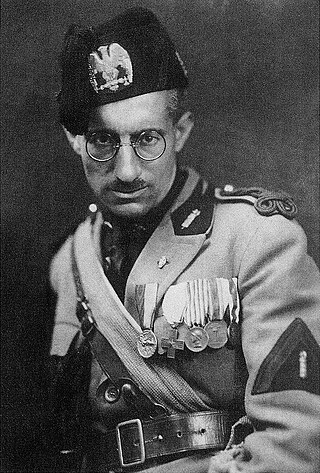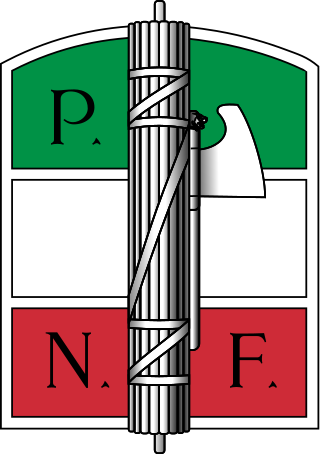Related Research Articles

Michele Bianchi was an Italian revolutionary syndicalist leader who took a position in the Unione Italiana del Lavoro (UIL). He was among the founding members of the Fascist movement. He was widely seen as the dominant leader of the leftist, syndicalist wing of the National Fascist Party. He took an active role in the "interventionist left" where he "espoused an alliance between nationalism and syndicalism." He was one of the most influential politicians of the regime before his succumbing to tuberculosis in 1930. He was also one of the grand architects behind the "Great List" which secured the parliamentary majority in favor of the fascists.

Fascio is an Italian word literally meaning "a bundle" or "a sheaf", and figuratively "league", and which was used in the late 19th century to refer to political groups of many different orientations. A number of nationalist fasci later evolved into the 20th century Fasci movement, which became known as fascism.

Augusto Turati was an Italian journalist and Fascist politician.

The National Fascist Party was a political party in Italy, created by Benito Mussolini as the political expression of Italian fascism and as a reorganisation of the previous Italian Fasces of Combat. The party ruled the Kingdom of Italy from 1922 when Fascists took power with the March on Rome until the fall of the Fascist regime in 1943, when Mussolini was deposed by the Grand Council of Fascism. The National Fascist Party was succeeded by the Republican Fascist Party in the territories under the control of the Italian Social Republic, and it was ultimately dissolved at the end of World War II.

The National Afterwork Club was the Italian fascist leisure and recreational organization for adults.
Women in Italy refers to women who are from Italy. The legal and social status of Italian women has undergone rapid transformations and changes during the past decades. This includes family laws, the enactment of anti-discrimination measures, and reforms to the penal code.

This is a list of words, terms, concepts, and slogans in the Italian language and Latin language which were specifically used in Fascist Italian monarchy and Italian Social Republic.

Lilia Silvi was an Italian film actress. Silvi was one of several young actresses presented as an Italian equivalent to the Canadian-born Hollywood star Deanna Durbin. She appeared opposite Amedeo Nazzari, the most popular Italian star of the era, in five films.

Seconda B is a 1934 Italian comedy film directed by Goffredo Alessandrini and starring Sergio Tofano, Dina Perbellini and María Denis. It was screened at the Venice Film Festival where it was awarded a prize. It started a trend for "schoolgirl comedies" during the Fascist era, targeted primarily at girls and young women audiences. The title itself refers to a school class. The film is set in the early 1910s.
Massaie Rurali was an Italian organisation for peasant women within the Italian Fascist Party (PNF). MR was founded in 1933 and disbanded in 1945. It was the largest women's organisation in Fascist Italy and one of the largest organisations, with more than three million members in 1943.

Fasci Femminili (FF) ("Female Groups") was the women's section of the Italian Fascist Party (PNF). The FF was founded in 1919 and disbanded in 1945. It incorporated all the other Fascist organizations for women and girls, which were all formally sections of the FF.
Victoria de Grazia is the Moore Collegiate Professor of History at Columbia University and founding editor of Radical History Review.
Elisa Majer Rizzioli, was an Italian politician of the National Fascist Party (PNF).
Laura Marani Argnani, was an Italian politician of the National Fascist Party (PNF).
Giuditta "Itta" Stelluti Scala Frascara was an Italian politician of the National Fascist Party (PNF).
Clara Franceschini, was an Italian politician of the National Fascist Party (PNF).
Baroness Teresita Menzinger Ruata, was an Italian politician of the National Fascist Party (PNF).
Wanda Bruschi Gorjux (1889–1976), was an Italian politician of the National Fascist Party (PNF).

Olga Medici del Vascello, was an Italian politician of the National Fascist Party (PNF).
References
- ↑ Victoria de Grazia How Fascism Ruled Women: Italy, 1922-1945 39-
- ↑ Victoria de Grazia How Fascism Ruled Women: Italy, 1922-1945 39-
- ↑ Willson, P. (2022). A ‘Shining Example of Fascist Womanhood’: Angiola Moretti 1925–1943. European History Quarterly, 52(4), 744–767. https://doi.org/10.1177/02656914221120163
- ↑ Victoria de Grazia How Fascism Ruled Women: Italy, 1922-1945 268
- ↑ de Grazia, V. (1992). How Fascism Ruled Women: Italy, 1922–1945. USA: University of California Press.